|
|
|
Sort Order |
|
|
|
Items / Page
|
|
|
|
|
|
|
| Srl | Item |
| 1 |
ID:
170948
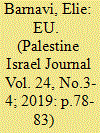

|
|
|
| 2 |
ID:
123407
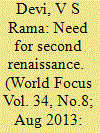

|
|
|
|
|
| Publication |
2013.
|
| Summary/Abstract |
The Renaissance, which literally means rebirth, renewal, rediscovery, refers to the period in European civilization spanning the fourteenth to the sixteenth centuries that immediately followed the Middle Ages. While popularly understood as a revolution in architecture, painting and sculpture in Europe during this period, the Renaissance was not merely an artistic and literary movement. For the scholars and thinkers of the day, it was a time for the revival of classical literature, learning, wisdom and values.
|
|
|
|
|
|
|
|
|
|
|
|
|
|
|
|
| 3 |
ID:
118729
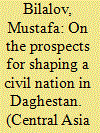

|
|
|
|
|
| Publication |
2012.
|
| Summary/Abstract |
Russia's integrity depends on ensuring civil identity as a priority factor in the development of society and the individual. Civil identity is fully realized in a civil nation that gradually takes shape within a particular society. The crisis of multiculturalism in the West triggered by the crisis of the European civilization and culture calls for a revision of certain ideas and theories associated with civil identity.
|
|
|
|
|
|
|
|
|
|
|
|
|
|
|
|
| 4 |
ID:
131434
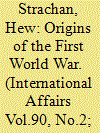

|
|
|
|
|
| Publication |
2014.
|
| Summary/Abstract |
The recent crop of books on the origins of the First World War dispenses with the notion of inevitability in the outbreak of war, and stresses the maturity of European civilization in 1914. They are in danger of prioritizing urban life over rural, civilization and culture over backwardness and superstition. They also say less than they might about the enduring place of war in international relations. The stress on contingency is to be welcomed for getting history away from the determinism of long-term trends, and for reopening the uncertainty of the outcomes still open to the Great Powers in 1914. However, the overall effect is cyclical. The prevailing wisdom on the reasons for war has reverted to the argument that 'Europe slithered over the brink', which dominated from the 1930s until the publications of Fritz Fischer in the 1960s. This does not mean that 'Fischerism', with its belief in German war guilt, is extinct. The challenge which now confronts historians, as they approach a four-year centenary, is to break this circularity and to explore new paths.
|
|
|
|
|
|
|
|
|
|
|
|
|
|
|
|
| 5 |
ID:
117410
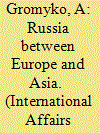

|
|
|
|
|
| Publication |
2012.
|
| Summary/Abstract |
MODERN RUSSIA perceives itself, thinks and acts mainly as a European power. Its "Europeanness" is not related to the status of its relations with the European Union or other organizations west of the Russian borders. Being a Russian European is not synonymous to thinking that there is no alternative to the policy of integrating Russia into some alliances and groupings created in the Atlantic part of the Old World after the end of World War II and before the breakup of the Soviet Union. In building its foreign policy Russia proceeds from the premise that its most developed and densely populated part is in Europe and that for the past three centuries its political, diplomatic, economic, scientific and cultural history has been connected, above all, to this part of the world. Russia - one of the largest components of European civilization - has spread it over millions of square kilometers from the Ural Mountains to the Pacific Ocean, bringing it not only to Siberia but also to the Far East and Central Asia.
|
|
|
|
|
|
|
|
|
|
|
|
|
|
|
|
| 6 |
ID:
107231
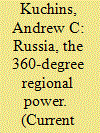

|
|
|
|
|
| Publication |
2011.
|
| Summary/Abstract |
" For the first time in its history..Russia finds itself surrounded by states and political groupings that are economically, demographically, and politically more dynamic than itself."
|
|
|
|
|
|
|
|
|
|
|
|
|
|
|
|
| 7 |
ID:
127473
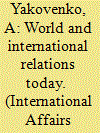

|
|
|
|
|
| Publication |
2013.
|
| Summary/Abstract |
TODAY, when the fifth year of the global financial and economic crisis is drawing to a close, no one has any doubts that the world has entered a period of radical transformation. The crisis of Soviet society and the social system, which brought about an end of the Cold War between the 1980s and the 1990s, has now been supplemented by a crisis of Western society, including a liberal economy and broad representative democracy. So, systemic setbacks in the Euro-Atlantic region - and these two models reflect the collective experience of public development across the space of European civilization, ensuring its domination in the global economy, politics and finances within the framework of a bipolar system - have become key elements of the global crisis. In essence, a line was drawn under a prolonged cycle of historical development that had started with the catastrophe of World War I. And just as the 20th century began in 1914, so it could be argued that the 21st century began with 2008, when the crisis erupted.
|
|
|
|
|
|
|
|
|
|
|
|
|
|
|
|
|
|
|
|
|